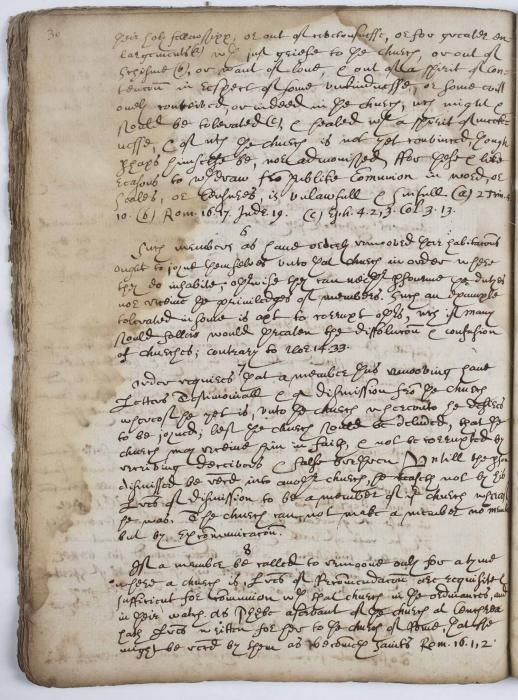
30
their holy fellowshipp, or out of covetousnesse, or for greater en=
largements(a) wth just griefe to the church, or out of
Schisme(b), or want of love, & out of a spirit of con=
tencion in respect of some unkindnesse, or some evill
onely conceived, or indeed in the church, wch might &
should be tolerated(c), & sealed wth a spirit of meek=
nesse, & of wch the church is not yet convinced, though
phaps himselfe be, nor admonished, For these & like
reasons to withdraw from publike communion in word, or
scales, or Censures, is unlawfull & sinfull (a) 2 Tim.4.
10. (b) Rom.16.17. Jude 19. (c) Eph.4.2,3. Col.3.13.
6
Such members as have orderly remooved their habitacions
ought to joyne themselves unto that church in order where
they do inhabite, otherwise they can neither pfourme the dutyes
nor receive the priviledges of members. Such an example
tolerated in some is apt to corrupt others, wch if many
should follow would threaten the dissolucion & confusion
of churches; contrary to 1 Cor.14.33.
7
Order requires that a member thus remooving have
Letters Testimoniall & of dismission from the church
whereof he yet is, unto the church whereunto he desired
to be joined; left the church should be deluded, that the
church may receive him in faith, & not be corrupted by
receiving deceivers & false brethren. Untill the pson
dismissed be recd into another church, he ceaseth not by his
Lers of dismission to be a member of ye church whereof
he was. The church can not make a member no member
but by excommunication.
8
If a member be called to remoove only for a tyme
where a church is, Lers of Recommendacion are requisite &
sufficient for communion wth that church in the ordinances, and
in their watch. as Phebe a servant of the church at Cenchrea
hath Lers written for her to the church of Rome, that she
might be recd by them as becometh saints Rom.16.1,2
